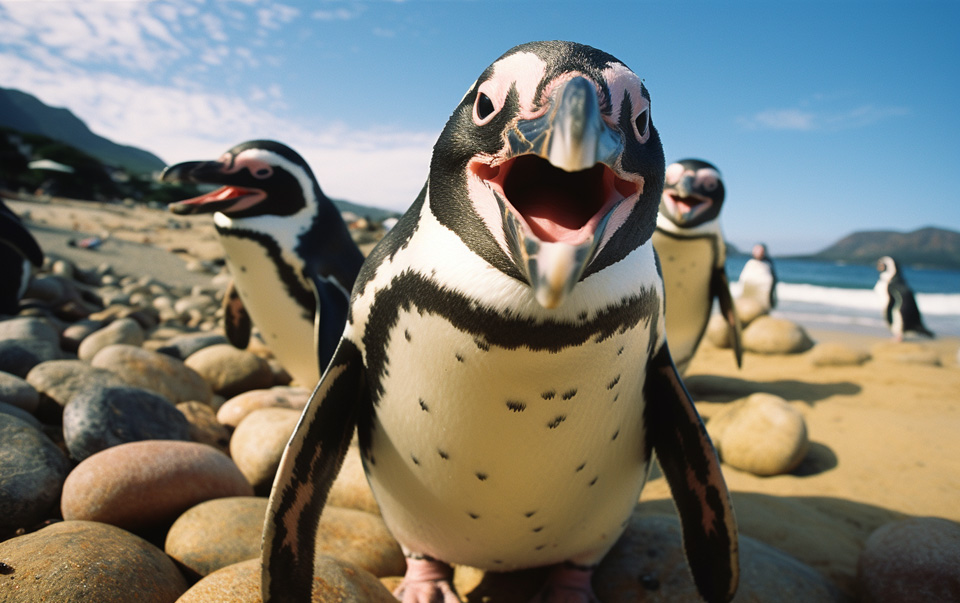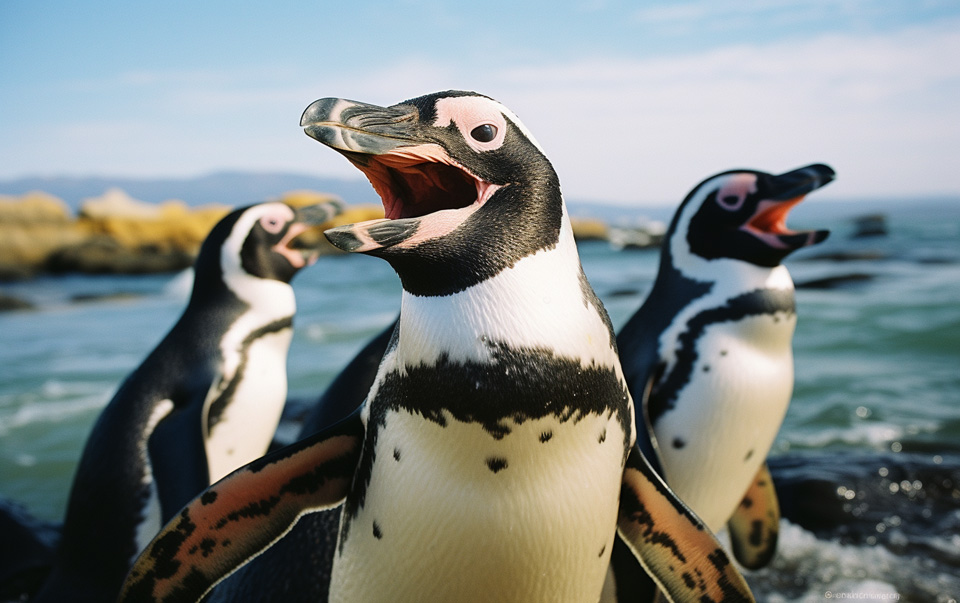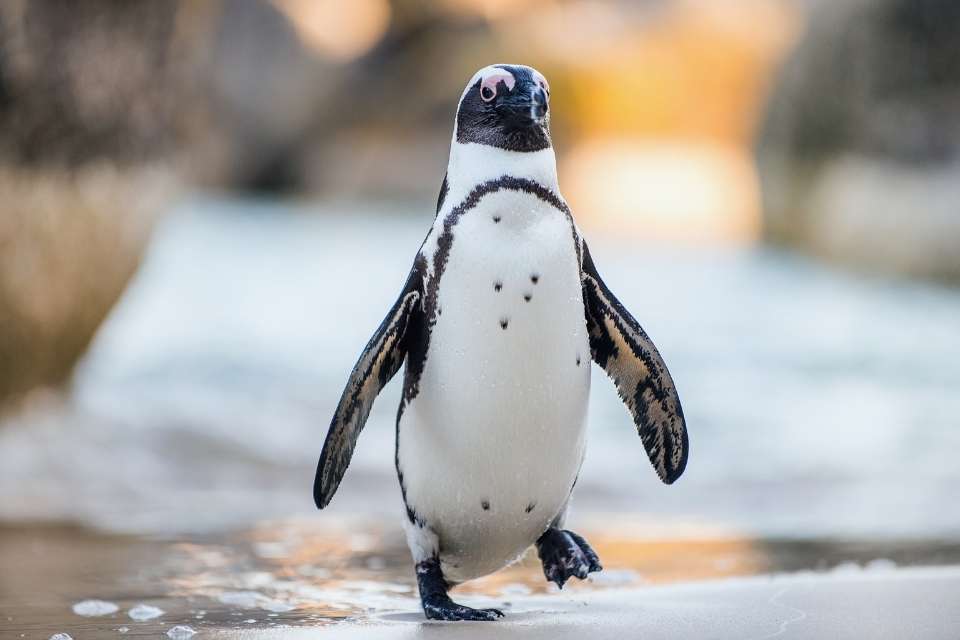Penguins are fascinating creatures known for their adorable waddles and distinctive appearance. But have you ever wondered if they make any noise?
Well, the answer is yes! Penguins indeed produce various sounds, which are an essential part of their communication repertoire. These vocalizations play a crucial role in their social interactions and survival.
Key Takeaways:
- Penguins do make noise and use vocalizations as a means of communication.
- Their vocalizations help establish social bonds, locate mates and chicks, and defend territories.
- Different penguin species have unique vocal habits, from chirps and squawks to trumpeting calls.
- Penguin vocalizations are particularly important during the breeding season when colonies become crowded.
- Penguins have evolved specialized adaptations, such as their syrinx, to produce a wide range of sounds.
Types of Penguin Vocalizations
When it comes to communication, penguins have quite the vocal range. They use a variety of sounds to convey different messages depending on their needs.
One common vocalization is the repetitive and high-pitched “chirp” calls, which are often heard among Adelie penguins. These chirps help penguins communicate with their colony members, assisting in social bonding and coordination.
On the other hand, species like the Emperor penguins produce deep, resonant “trumpeting” sounds that can travel long distances. This vocalization helps them locate each other in their vast, icy habitats.
It’s fascinating to witness how these different vocal habits have evolved to suit the unique environments in which penguins live.
Additionally, penguins may also make hissing and growling sounds when they feel threatened or are engaged in territorial disputes. These vocalizations serve as a warning to potential intruders, helping penguins defend their territories and maintain order within their colonies.
Why Do Penguins Make Noise?

Penguins are known for their cute waddles and distinctive appearance, but did you know they also make noise? The truth is, penguins use vocalizations as a crucial part of their communication repertoire.
Just like humans, penguins use their voices to establish and maintain social bonds, locate their mates or chicks, and defend their territory. These vocalizations can range from soft chirps and squawks to loud trumpeting calls, each serving a specific purpose in their daily lives.
One of the primary reasons penguins make noise is for communication. Vocalizations help them interact with fellow colony members, identify their mates and offspring, and maintain social cohesion within the group.
During courtship rituals, penguins use specific calls to attract and recognize potential mates, deepening their social connections. Additionally, vocalizing also helps penguins establish and defend their territories, ensuring the safety of their nesting sites and food sources.
Penguins are exceptional navigators, especially during the breeding season when colonies become crowded. Their vocalizations play a crucial role in helping them maintain contact and navigate through the bustling crowd.
In the sea of similar-looking individuals, penguins can recognize their own mate and chicks by their unique vocal signatures. This enables them to reunite and provide effective care for their young ones.
In conclusion, penguins make noise as a means of communication, bonding, navigation, and territorial defense. Their vocalizations are an essential part of their social structure, allowing them to thrive in their icy habitats.
So, next time you encounter a penguin, take a moment to appreciate their adorable appearance and their unique ability to talk!
Communication in the Wild
In the wild, penguins rely heavily on vocalizations to navigate and communicate effectively within their crowded colonies. These vocal cues play a crucial role during the breeding season when hundreds or even thousands of penguins gather in close proximity.
By emitting distinct calls, penguins are able to establish contact with one another, ensuring they can navigate through the bustling crowd without losing their way.
Furthermore, vocalizations help penguins recognize their mates and chicks amidst the sea of similar-looking individuals. Each penguin has a unique voice signature, similar to human fingerprints, allowing them to identify their own calls and the calls of their family members.
This recognition is vital for successful breeding and parental care, as it helps them locate their loved ones and provide them with the necessary care and protection.
Notably, penguin vocalizations are not limited to simple squawks or chirps. Some researchers have discovered that different penguin species within the same colony have distinct dialects or accents.
This intriguing variation adds complexity to their vocal communication and emphasizes the importance of detailed vocal studies to understand the rich social structure of penguin communities in the wild.
Vocal Adaptations in Penguins
Penguins, with their unique vocalizations, have evolved fascinating anatomical adaptations that enable them to communicate effectively in their environments. One vital adaptation is their specialized syrinx, the vocal organ located at the base of their trachea.
This syrinx allows penguins to produce a diverse range of sounds and control the pitch and volume of their calls. Its positioning within their body, closer to their lungs, further aids in projecting their vocalizations even in noisy and windy conditions.
This specialized syrinx gives penguins the ability to adapt their vocalizations to different circumstances. For instance, during courtship rituals, penguins can produce distinctive calls to attract and recognize potential mates.
Additionally, when feeling threatened or engaging in territorial disputes, penguins can use hissing and growling sounds to assert dominance and defend their territory. These vocal adaptations play a crucial role in penguins’ social lives and their ability to navigate their environments.
The syrinx is not the only adaptation that contributes to penguins’ vocalizations. Their unique body shape and posture also enhance their ability to produce clear and distinct calls.
The streamlined body of penguins allows for the efficient transmission of sound through the air, while their upright posture helps project their vocalizations over long distances. These adaptations demonstrate the evolutionary significance of vocal communication in penguins and highlight their remarkable adaptability to their habitats.
Fun Facts About Penguin Sounds
While penguins are beloved for their adorable appearance and waddling gait, there is so much more to these fascinating creatures than meets the eye.
One of the most intriguing aspects of penguins is their unique vocalizations, which they use for a variety of purposes. Here are some fun facts about penguin sounds that will leave you amazed!
- Individual Voice Signatures: Just like human fingerprints, penguins have their own distinct voice signatures. Each penguin has a unique vocal pattern that allows them to recognize their own calls and identify the calls of their mates. This helps them maintain social bonds and navigate through their crowded colonies with ease.
- Dialects and Accents: Did you know that different penguin species have their own distinct dialects or accents within their colonies? Researchers have discovered that penguins from different regions can have slight variations in their vocalizations, adding a level of complexity to their communication. It’s almost like they have their own language!
- A Wide Range of Sounds: Penguins are skilled at producing a wide range of sounds, from soft chirps and squawks to loud trumpeting calls. Their specialized syrinx, the vocal organ located at the base of their trachea, enables them to control the pitch and volume of their calls. This adaptation allows penguins to communicate effectively, even in noisy and windy environments.
- Communication Secrets: The vocalizations of penguins reveal fascinating insights into their social structures and behaviors. Through their calls, penguins establish and maintain social bonds, identify their mates and chicks, and defend their territories. Studying their unique vocal habits provides us with a deeper understanding of these incredible birds and their lives in the wild.
So, the next time you see a penguin waddling along or hear their distinctive calls, remember these fun facts about their vocalizations.
Penguins truly possess a remarkable ability to communicate and connect with one another, showcasing the unique and fascinating world of these beautiful birds.
Conclusion
In conclusion, penguins are remarkable communicators, using their vocalizations to navigate their social world and ensure the well-being of their colony. Through a range of sounds, from gentle chirps to powerful trumpets, penguins establish and maintain social bonds, locate their mates and chicks, and defend their territory.
These vocalizations are essential during the breeding season when colonies become crowded, allowing penguins to stay connected and care for their young effectively.
One fascinating aspect of penguin vocalizations is their individuality. Just like human fingerprints, each penguin has a unique voice signature, allowing them to recognize their own calls and the calls of their mates.
Additionally, different penguin species have distinct accents within their colonies, adding complexity to their vocal communication.
Studying the vocal habits of penguins not only provides us with insights into their social structures but also deepens our understanding of these captivating birds in the wild.
So, the next time you encounter a penguin, appreciate their adorable appearance and remember their amazing ability to communicate through sound.
FAQ
Do penguins make noise?
Yes, penguins do make various sounds as part of their communication repertoire.
What types of vocalizations do penguins make?
Penguins can produce chirps, squawks, trumpeting sounds, hisses, and growls.
Why do penguins make noise?
Penguins use vocalizations to establish social bonds, locate mates and chicks, and defend their territory.
How do penguins communicate in the wild?
Vocalizations are particularly important during the breeding season when penguin colonies become crowded. They help penguins maintain contact and recognize their mates and chicks.
What vocal adaptations do penguins have?
Penguins have a specialized syrinx, their vocal organ, which allows them to produce a wide range of sounds and control the pitch and volume of their calls.
Are penguin vocalizations unique?
Yes, each penguin has a unique vocal pattern, similar to human fingerprints. Different penguin species may also have distinct dialects within their colonies.
What are some fun facts about penguin sounds?
Penguins have individual voice signatures, and their vocalizations can be heard even in noisy and windy environments.


